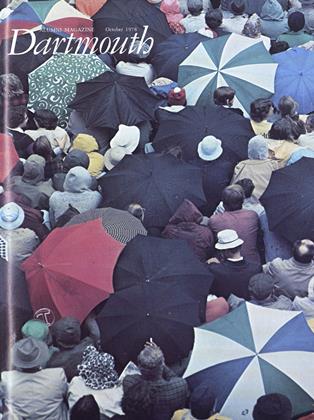On a gossamer night in mid-summer, Saul Bellow, the Nobel laureate for literature, came to the College to talk about "Writing for Dear Life." His speech, sponsored by the Class of 1930 Fellowship, was full of wintry allusions but ended, as do his novels, with an affirmation of the human spirit.
He recalled his beginnings as a writer in Chicago, a city he moved to as a youth from his native Canada. Looking out the window of his apartment in a recent winter when the temperature was 20-below, he saw ocean-going ships stuck in the ice of Lake Michigan and that made him remember a similar winter when he was a young man in the Depression.
Citing Ezra Pound's statement that there are books which state things for a time, for the time, he said you feel this on a winter day in Chicago - an immense vitality trying to break free.
The young writers of Chicago of that Depression time, Bellow said, trying to write stories, reading them to one another, and talking about minds, culture, epistemology, lived in $3-a-week rooms "where you could hear the paste sifting down behind the buckling wallpaper, with smoke of the garbage dumps coming in the window, and colonies of bugs chewing away at the furniture legs."
For a student in Chicago, "life could be entertaining." When one was no longer a student but merely a struggling writer, Bellow said, life became difficult to justify. A former professor met him on the street in 1939, pierced him with a look from behind gold-framed spectacles, and asked, "How is the romancier?" The romancier, Bellow confessed, had to admit that "he was not so hot."
But Bellow had already determined to seek a significant life in his own way. He didn't take Wyndham Lewis' criticism of the American city as a rootless elysium too seriously. "We can't have a rootless life - attachments have to be restored and renewed."
"The leap toward the marvelous is still a possibility to be considered," he said. "Very few people talk anymore about the marvelous. Where has it gone? Where has it been put? If someone stole. Lake Michigan, he'd have to put it someplace else. Among those who still search for the marvelous are certain writers who are writing for dear life."
 View Full Issue
View Full Issue
More From This Issue
-
 Feature
FeatureThe Lady and the Truckers
October 1978 By Mary Ellen Donovan -
 Feature
FeatureBeauty and the Beasts
October 1978 By William Morgan -
 Feature
FeatureConundrum of the Gridiron
October 1978 By Jack DeGange -
 Feature
FeatureA Matter of Perspective
October 1978 -
 Article
ArticleSignal-Caller for the Hurt
October 1978 By D.M.N. -
 Article
ArticleOffice of Development Report of Voluntary Giving
October 1978







